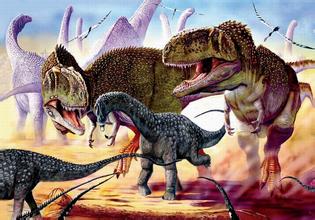Currie now began to think the idea of large meat-eating dinosaurs as pack hunters was a serious possibility.
Currie现在开始认为大型食肉恐龙是群体狩猎者的可能性很大
But to prove his hunch, he needed hard evidence,
但是为了证明他的假设,他必须找出证据
like that which had been found for the plant-eating dinosaurs.
类似植食恐龙身上的那些证据
What he needed was to find a bone bed where a group of mega-carnivores,
他需要找到一片埋葬着数只大型食肉恐龙的化石场,
any meat-eating giants no matter what species, lay buried together.

If we can find a bone bed with a lot of carnivores in one place,
如果我们能找到一处埋着很多食肉恐龙的化石场
then we have an indication that those animals died together.
那就说明它们是一起死去的
If they died together, there's a very high probability they may have been living together.
如果它们真是一起死去,很有可能它们生前也在一起生活
The only way we can actually demonstrate if an animal is a group hunter,
唯一能证明这些动物是群体狩猎者的证据
or even come close to thinking about that, is by finding an assemblage
或者让我们开始相信这种说法的证据就是一片骨骼化石群
where there are multiple individuals of different age sizes,
包括各个年龄层次的个体
from small individuals all of the way to big adults, buried together at the same time.
从小恐龙到大个的成年恐龙都应该埋在同一地层中
So for Currie, the search was on around the world for just such a site.
所以对于Currie来说,他寻遍全世界只是为了找到一个地点
And then...he remembered something.


